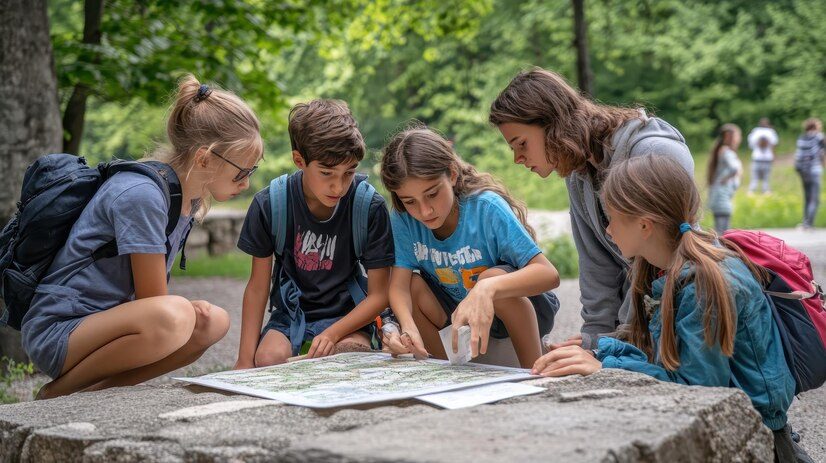Introduction:
In a world where technology dominates much of the learning environment, the importance of stepping outside and engaging in hands-on, real-world experiences has become more critical than ever. At DWPS, the Top Schools in Greater Noida where outdoor education provides students with unique learning opportunities that extend beyond traditional classroom settings. By fostering an appreciation for nature, encouraging collaboration, and promoting problem-solving skills, outdoor education offers a holistic approach to learning that is increasingly recognized by educational institutions around the globe.
This article delves into the significance of outdoor education, how it enhances student development, and its lasting impact on learners, drawing from experiences and practices in some of the most highly rated schools.
What is Outdoor Education?
Outdoor education refers to organized learning experiences that take place outside the conventional classroom. This type of education can include a wide range of activities, such as nature walks, environmental studies, adventure-based learning, field trips, and camping experiences. The primary goal is to encourage experiential learning, where students engage directly with their surroundings, apply critical thinking skills, and develop a deeper understanding of the world around them.
The concept is rooted in the belief that education should not be limited to four walls. Instead, students should be exposed to different environments and challenges that promote personal growth, team building, and environmental stewardship. Outdoor education encompasses academic lessons, physical activities, and social-emotional learning, all within the context of the natural world.
The Benefits of Outdoor Education
- Enhanced Learning through Experience
Learning by doing has long been recognized as one of the most effective ways to retain knowledge. Outdoor education allows students to engage in hands-on activities, making abstract concepts more tangible and relatable. For instance, biology lessons become more meaningful when students can observe plants and animals in their natural habitats. Similarly, geography lessons come to life when students explore local ecosystems, landscapes, and water bodies.
- Improved Physical and Mental Health
One of the most significant benefits of outdoor education is its impact on physical and mental well-being. Outdoor activities encourage movement, reducing the sedentary lifestyle that can come from spending too much time indoors. Additionally, being in nature has been shown to reduce stress, improve mood, and increase overall happiness. Students who participate in outdoor education are more likely to develop a positive attitude toward learning and life in general.
- Development of Critical Thinking and Problem-Solving Skills
The unpredictability of the natural environment presents unique challenges that require students to think critically and problem-solve in real-time. Whether it’s navigating a hiking trail, identifying plants and animals, or building a shelter during a camping trip, outdoor education encourages students to assess situations, make decisions, and work through problems with creativity and resourcefulness.
- Fostering Environmental Stewardship
As the world grapples with environmental challenges, outdoor education plays a crucial role in developing environmental awareness and responsibility in students. By spending time in nature, students develop a deeper appreciation for the environment and learn about the importance of conservation. This connection to nature often translates into lifelong habits of sustainability and environmental stewardship.
- Encouraging Collaboration and Teamwork
Many outdoor education activities are designed to be collaborative, requiring students to work together to achieve common goals. From group hikes to team-building exercises, students learn the value of communication, trust, and cooperation. These experiences help build strong interpersonal skills, which are essential for success in both academic and personal life.
- Building Resilience and Confidence
Outdoor education often involves overcoming physical and mental challenges, whether it’s navigating a difficult terrain, solving a problem in a group, or learning to cope with the unexpected. These experiences help students build resilience, a key trait that fosters perseverance and the ability to handle adversity. In turn, students gain confidence in their abilities and a sense of accomplishment from successfully completing challenging tasks.
Outdoor Education in Action
Educational institutions that prioritize outdoor learning provide their students with diverse opportunities to engage with nature and the community. Some of the top schools implement outdoor education programs that are seamlessly integrated into the curriculum, allowing students to experience hands-on learning throughout the academic year.
- Nature Walks and Eco-Trails
One of the simplest yet most effective forms of outdoor education is the nature walk. Students venture into local parks, forests, or eco-trails to explore the natural world firsthand. During these excursions, students are encouraged to observe their surroundings, identify plants and animals, and document their findings. Nature walks not only support lessons in biology and environmental science but also provide students with the opportunity to reflect and connect with nature.
- Field Trips
Field trips are a staple of outdoor education and provide students with immersive learning experiences. Whether visiting historical landmarks, geological sites, or wildlife reserves, field trips allow students to apply classroom knowledge in real-world settings. For example, a visit to a local museum or heritage site can deepen students’ understanding of history, while a trip to a marine center can bring marine biology lessons to life.
- Adventure-Based Learning
Adventure-based learning is another exciting aspect of outdoor education. Activities such as rock climbing, canoeing, and orienteering challenge students to step outside their comfort zones, push their limits, and embrace new experiences. These activities help develop leadership skills, resilience, and the ability to take calculated risks, all of which are essential qualities in today’s fast-changing world.
- Camping and Wilderness Survival Skills
Some of the most impactful outdoor education experiences come from multi-day camping trips. These trips provide students with the chance to learn essential wilderness survival skills, such as setting up a tent, building a fire, and cooking outdoors. Students also develop independence and responsibility as they manage their own supplies, navigate the wilderness, and work together to complete group tasks. Camping trips are not only educational but also offer unforgettable bonding experiences among peers.
- Environmental Service Projects
Outdoor education also includes community service initiatives focused on the environment. Students participate in tree planting, beach clean-ups, and recycling projects, learning about sustainability and the positive impact they can have on their local environment. These activities foster a sense of social responsibility and teach students the importance of giving back to their communities.
The Impact of Outdoor Education on Student Development
The skills and lessons learned through outdoor education have far-reaching impacts on students’ academic and personal development. Research shows that students who participate in outdoor learning experiences perform better in school, exhibit improved behavior, and demonstrate increased motivation to learn.
- Improved Academic Performance
Outdoor education has been linked to enhanced academic performance, particularly in subjects such as science, geography, and environmental studies. When students engage in hands-on learning, they retain information more effectively and develop a deeper understanding of complex concepts. Furthermore, the experiential nature of outdoor education encourages curiosity and critical thinking, which are essential for academic success.
- Social-Emotional Learning
Beyond academic achievements, outdoor education contributes to the social-emotional development of students. Engaging in outdoor activities promotes self-awareness, emotional regulation, and empathy. Students learn to manage their emotions when faced with challenges, and they develop stronger connections with their peers through shared experiences. Outdoor education also provides opportunities for leadership development, as students take on roles that require responsibility and decision-making.
- Lifelong Skills
The lessons learned in outdoor education extend well beyond the school years. Skills such as problem-solving, collaboration, resilience, and environmental stewardship are critical for success in adulthood. Outdoor education teaches students how to navigate real-world challenges, work as part of a team, and make informed decisions. These skills are transferable to a wide range of careers and life situations.
The Role of Schools in Promoting Outdoor Education
Schools play a vital role in promoting outdoor education and ensuring that students have access to meaningful outdoor learning experiences. Institutions that prioritize outdoor education often integrate it into their core curriculum, making it an essential part of the learning experience rather than an occasional activity.
- Creating Outdoor Classrooms
Many schools have taken the initiative to create outdoor classrooms where students can engage with nature during regular school hours. These outdoor spaces are designed to facilitate experiential learning and provide a change of environment that stimulates creativity and curiosity. By incorporating outdoor learning into daily routines, schools help students develop a stronger connection to the natural world.
- Partnerships with Environmental Organizations
Schools can enhance their outdoor education programs by partnering with environmental organizations, conservation groups, and local parks. These partnerships provide students with access to expert knowledge, resources, and hands-on opportunities to contribute to environmental initiatives. Collaborating with external organizations also helps schools expand the scope of their outdoor education programs and create impactful learning experiences.
- Teacher Training and Support
For outdoor education to be effective, teachers must be trained in experiential learning methods and equipped with the tools to lead outdoor activities. Schools that invest in professional development for their teachers ensure that outdoor education is delivered effectively and safely. Teacher support is critical for creating an engaging and enriching outdoor learning environment.
Conclusion:
At DWPS, the Best School in Greater Noida where outdoor education offers students a chance to learn in ways that go beyond the traditional classroom setting. By stepping into nature, students gain a deeper understanding of academic subjects, develop essential life skills, and foster a lasting connection with the environment. The hands-on, experiential nature of outdoor education promotes personal growth, resilience, and a love for learning that extends well beyond the school years.
As educational institutions continue to recognize the value of outdoor education, the integration of outdoor learning experiences into the curriculum will play an increasingly important role in shaping the future of education. By encouraging students to explore, discover, and engage with the world around them, outdoor education prepares them not just for academic success, but for life.

